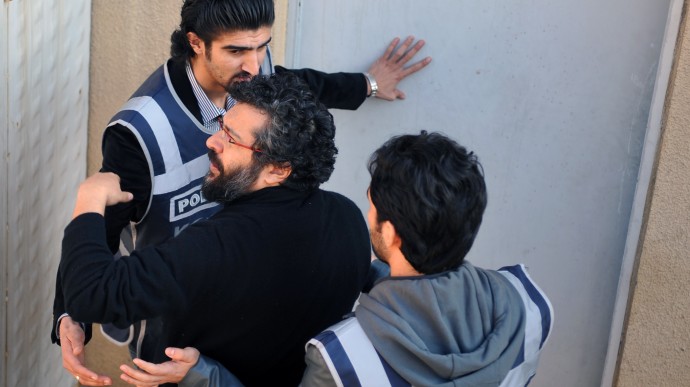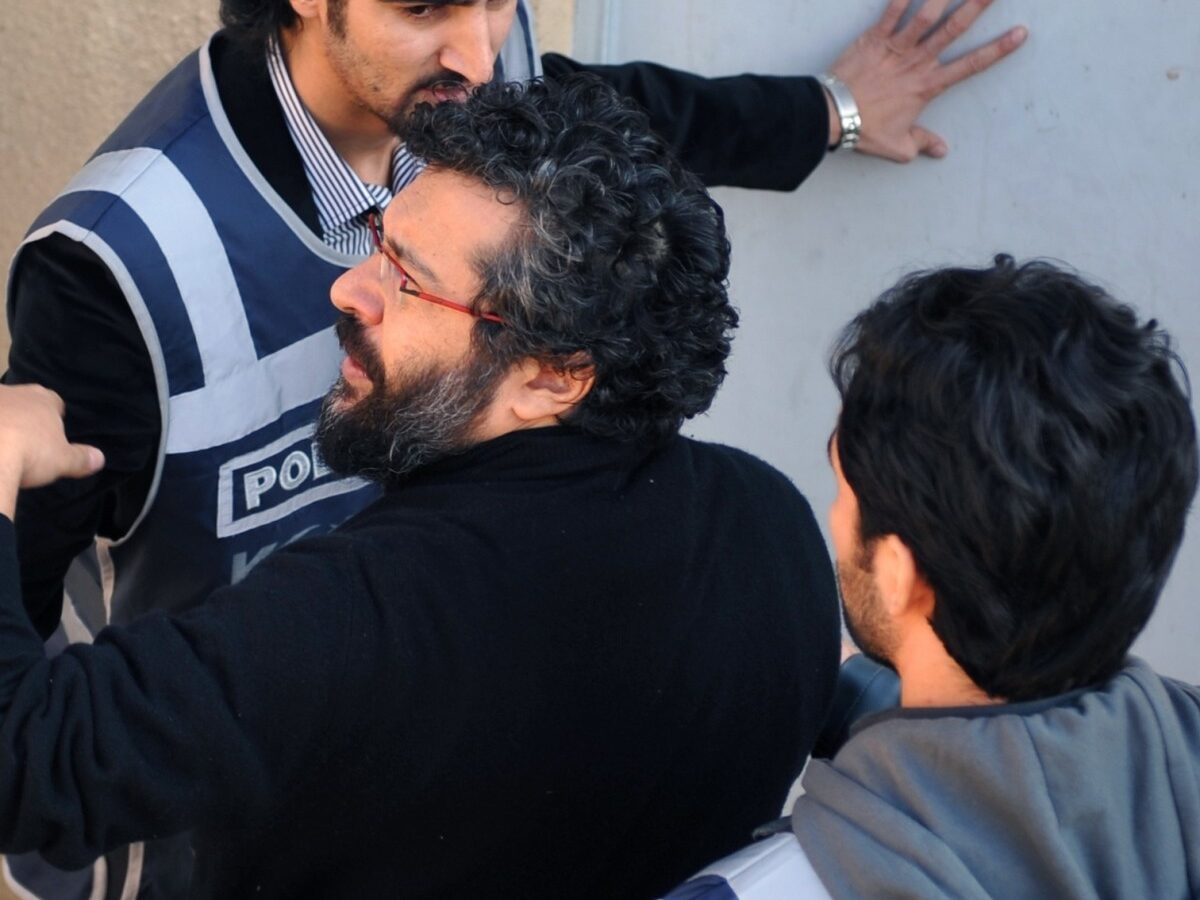
(NAMIBIA) MintPress- Imprisonment of journalists has reached a record high, the Committee to Protect Journalists (CPJ) reported this week. According to a special report released Tuesday, CPJ had identified 232 individuals behind bars worldwide as of Dec. 1 – an increase of 53 compared to data from 2011.
More journalists were jailed in 2012 than any other year on record since CPJ began conducting worldwide surveys in 1990. The previous record was documented in 1996 with 185 journalists behind bars.
Turkey, Iran and China lead the world with the highest number of imprisonments, all of which are based on vague anti-state laws used to silence journalists reporting dissenting political views and those of ethnic minorities.
“We are living in an age when anti-state charges and ‘terrorist’ labels have become the preferred means that governments use to intimidate, detain, and imprison journalists,” said CPJ Executive Director Joel Simon in a press statement. “Criminalizing probing coverage of inconvenient topics violates not only international law, but impedes the right of people around the world to gather, disseminate, and receive independent information.”
There are currently at least 132 journalists worldwide being held on anti-state charges including terrorism, treason and subversion. Turkey, the world’s worst jailer, is particularly well-known for its broad-sweeping anti-terror legislation that punishes journalists for reporting or publishing any information that may be interpreted as propagation of terrorist groups.
Eritrea and Syria make the top five list, both known for holding journalists under harsh conditions in secret prisons, often times without charges or due process. Vietnam, Azerbaijan, Ethiopia, Uzbekistan and Saudi Arabia round out the top 10 list for the most journalists behind bars.
Sixty-three journalists across the world are being held in prisons without any publicly disclosed charge. An additional 67 journalists were also reported killed in 2012. The report did not mention arrests of journalists in the United States or other countries where journalists have been arrested and subsequently released in 2012.
Political unrest proves dangerous for journalists
Journalists reporting in countries experiencing political unrest in the form of protests and attempted military coups seem to be hit hardest by government restrictions on press freedom. As political unrest swept Syria in 2012, the government cracked down on protesters and journalists with grave human rights abuses.
“Big brother is never too far away — since the revolution it’s all the more difficult. As the uprising became more militarized, there was a greater risk of getting picked up,” said Rania Abouzeid, a Beirut-based correspondent for Time magazine. CPJ reported that Abouzeid, who has traveled to Syria to cover the conflict on various trips, said, “The regime will often set up sudden checkpoints, and once you’re there it’s difficult to turn around.”
Currently there are at least 15 journalists behind bars in Syrian prisons. Additionally, at least 32 journalists have been killed in Syria in 2012.
In Saudi Arabia, ranked on CPJ’s list of most censored countries in the world, there have been several journalists arrested for covering anti-government demonstrations in the oil-rich Eastern Province. CPJ ranks the country as the fifth worst nation for bloggers due to restrictive laws. In March, three Saudi web managers were arrested for hosting sites with content on pro-reform demonstrations that call for greater rights for the country’s Shiite minority.
Growing unrest in Sub-Saharan Africa has onlookers questioning whether journalists in the region may be in for a tougher crackdown in 2013. Fighting between M23 rebels and government forces in the eastern region of the Congo has already put journalists at risk as reports of arrests and death threats continue to be recorded.
At least four journalists reported significant threats last month in the eastern city of Bukavu while covering the escalating conflict between the heavily armed M23 militia and Congolese soldiers. Journalists in Danger (JED), a Congolese partner organization of Reporters Without Borders, reports that three national TV stations only resumed broadcasting last week after being off the air for 12 days when M23 rebels seized control of the city of Goma.
In previous years, western Bas Congo has been the site of censorship , assault and imprisonment of journalists. CPJ documented at least 34 press violations in the western province in 2011. While broadcasting is back up in Goma, residents fear M23 rebels may easily infiltrate the city and resume attacks in the region. Such instability will surely draw attention back to reporters and increase press violations perhaps in levels comparable to the western part of the country.
Where does the US stand?
According to CPJ, the majority of journalists arrested in 2012 were held in the Middle East, Asia or East Africa. The special report found just one imprisonment in Cuba – the only recorded arrest in the Americas. CPJ recorded no arrests in the region in the 2011 census.
In spite of CPJ’s report, journalists are not free from arrest in the United States. CPJ’s list only includes journalists incarcerated at 12:01 a.m. on Dec. 1, 2012 when the snapshot of data was recorded. It does not include the hundreds of journalists arrested and subsequently released throughout the year.
CPJ’s country profile of the United States reveals 20 recorded attacks and arrests against journalists covering protests and civil unrest associated with the Occupy movement in 2011.
Josh Stearns, Journalism and Public Media Campaign Director at Free Press, believes more than 90 journalists have been arrested in connection with the Occupy movement between September 2011 and September 2012.
Stearns has been confirming and verifying reports of journalist arrests through Storify since the grassroots movement against social and economic inequality emerged in New York in September 2011. Stearns has recorded at least 90 arrests in more than 12 cities across the United States, the majority of which were targeted at photojournalists.
Reporters Without Borders ranked the United States 47th on their 2011/2012 Press Freedom Index, largely because of restrictions on the press covering the Occupy movement. According to the report published in January, “the United States (47th) also owed its fall of 27 places to the many arrests of journalist covering Occupy Wall Street protests.”
Most journalists arrested while covering Occupy protests in the United States have been released from custody in a fairly timely manner. However, the restrictions on press are nonetheless present and ongoing. The one-year anniversary of the Occupy Wall Street movement this past September resulted in an unconfirmed number of journalist arrests.
Photographer Julia Reinhard was among those arrested at the anniversary protests in New York. A member of the National Press Photographers Association, Reinhart was arrested while wearing identification documents.
According to a statement published by the Huffington Post, the NPPA was “deeply concerned and troubled by the aggressive and indiscriminate manner in which officers and command staff are allegedly treating those exercising their First Amendment rights.”
End-of-year reports from Reporters Without Borders and CPJ will reveal whether the United States and other countries including the Congo and Syria have shown any improvement in releasing journalists or improving press freedoms in the rest of 2012.


